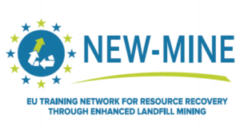In preparation of the 2nd ELFM Seminar in the European Parliament (20-11-2018), the EU Horizon 2020 MSCA-ETN NEW-MINE project has just published a new Policy Brief: “Why ELFM needs to be politically acknowledged to facilitate sustainable management of European landfills”. This Policy Brief highlights the importance to institutionalise ELFM, as the authors concur that “neglecting ELFM in EU policy and regulatory frameworks is not a neutral act but rather an effective way to lock in conventional practices and lock out ELFM”. Authors are Joakim Krook (Linköping University, Sweden), Peter Tom Jones (KU Leuven, Belgium) and Steven Van Passel (Antwerp University, Belgium). (PTJ, 5/11/2018)
- For a share of Europe’s 500,000 landfills, Enhanced Landfill Mining (ELFM) could offer a more sustainable management option than conventional practices by combining remediation with recovery of dormant materials, energy carriers and land resources.
- Developing cost-efficient and societally-motivated ELFM practices relies on extensive investments in know-how and technology innovation, policy support and market interventions.
- Neglecting ELFM in EU policy and regulatory frameworks is not a neutral act but rather an effective way to lock-in suboptimal, conventional practices.
- In order to stimulate investments in the area and enable policy support and market interventions, ELFM needs to become institutionalised and recognised as a potential option for landfill management and recovery of natural resources.
Key info Policy Brief NEW-MINE, November 2018
- Download NEW-MINE Policy Brief November 2018 here
- Authors: Prof. Joakim Krook, Dr. Peter Tom Jones & Prof. Steven Van Passel
- Project website NEW-MINE: http://new-mine.eu/
- Design: sciencewriter.si
- Acknowledgements: This project has received funding from the European Union’s EU Framework Programme for Research and Innovation Horizon 2020 under Grant Agreement No 721185.
- Disclaimer: the views expressed in this article are the private views of the author and may not, under any circumstances, be interpreted as stating an official position of ETN NEW-MINE, EURELCO or SIM² KU Leuven.
Want to react?
Send your comments to peter.jones@kuleuven.be.
About NEW-MINE (EU Training Network for Resource Recovery Through Enhanced Landfill Mining)
Europe has more than 500,000 landfill sites, with an estimated 90% of them being “non-sanitary” landfills, predating the EU Landfill Directive of 1999. These older landfills tend to be filled with municipal solid waste and often lack any environmental protection technology. In order to avoid future environmental and health problems, many of these landfills will soon require expensive remediation measures. This situation might appear bleak, but it does present us with an exciting opportunity for a combined resource-recovery and remediation strategy, which will drastically reduce future remediation costs, reclaim valuable land, while at the same time unlocking valuable resources. However, the widespread adoption of Enhanced Landfill Mining (ELFM) in the EU, as envisaged by NEW-MINE, urgently requires skilled scientists, engineers, economists and policy makers who can develop cost-effective, environmentally friendly ELFM practices and regulatory frameworks. All this demands a European commitment to concerted, inter- and transdisciplinary research and innovation. NEW-MINE trains 15 early-stage researchers (ESRs) in all aspects of landfill mining, in terms of both technological innovation and multi-criteria assessments. The technological innovation follows a value-chain approach, from advanced landfill exploration, mechanical processing, plasma/solar/hybrid thermochemical conversion and upcycling, while the multi-criteria assessment methods allow to compare combined resource-recovery/remediation ELFM methods with the “Do-Nothing”, “Classic remediation” and “Classic landfill mining with (co-)incineration” scenarios. By training the ESRs in scientific, technical and soft skills, they become highly sought-after scientists and engineers for the rapidly emerging landfill-mining and broader raw-materials industries of Europe.




